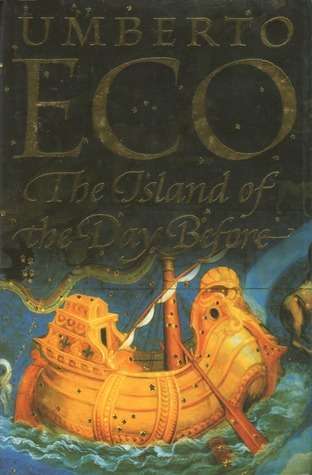Published by Secker & Warburg, 1995, hardcover, 513 pages, condition: new.
Umberto Eco, one of the greatest storytellers of all time, continues to enthrall readers with this exquisitely crafted novel that celebrates the romance, war, politics, philosophy, and science of the baroque period in all its lush and colorful detail.
Set in the 17th century, Eco's third novel tells the story of Roberto, a young nobleman. He survives war, the Bastille and shipwreck, and meets a variety of fantastical people, animals and machines as he voyages to a Pacific island straddling the date meridian.
I can't count the times I've tried to write a review of an Eco-book, whether physically or in my head, then decided to drop it.
Where does one start? How does one review a product of an intellect such as Eco's, a scholar in semiotics, history and god knows what else? Many reviews I've read here on The Island Of The Day Before are just plain moronic - outbursts of frustration because someone expected to grasp the contexts and countless themes it covers as easily as an airport-bestseller. I have a theory that some people that like to think they know a couple of things just don't like to feel stupid, and it's true; most of Eco's books are overwhelming in their breadth and references for a reader, so much so that one ends up feeling quite stupid.
But here's my point: Eco is firstly concerned with the polysemic and numerous ways in which meaning is created and interpreted, the history and epystemology of meaning, to be exact. To be able to understand the centennial intertextuality of language, symbols and meaning requires an intellect far greater than Eco or anyone else for that matter. I'm also pretty sure that Eco would facepalm himself if people assumed they could extract every meaning out his books by reading them once. Of all the authors and books out there, his are truly deserving of the cliche that the books need to be read several times to be understood. Eco's confidence and playfulness is what makes this book my absolute favorite. The subject, the mystery of latitude, is such a spot-on subject, and the great tapestry of references from his chosen era, the 17th century, he uses to weave this incredible story - not only in literature, but theology, astronomy, philosophy, history and science - come together in a story that is ultimately about a period of time where the paradigms of the church were cracking up, and the monopoly of truth and meaning was being heavily challenged by science. Eco manages to capture the mind of a young nobleman who is curious about the workings of the world and the universe, and so also the Zeitgeist of 17th century Europe: the volatility, the naivete, the wonder and the absurdity. If there ever was a point in history where the act of interpreting the world was so dynamic, it was here.

